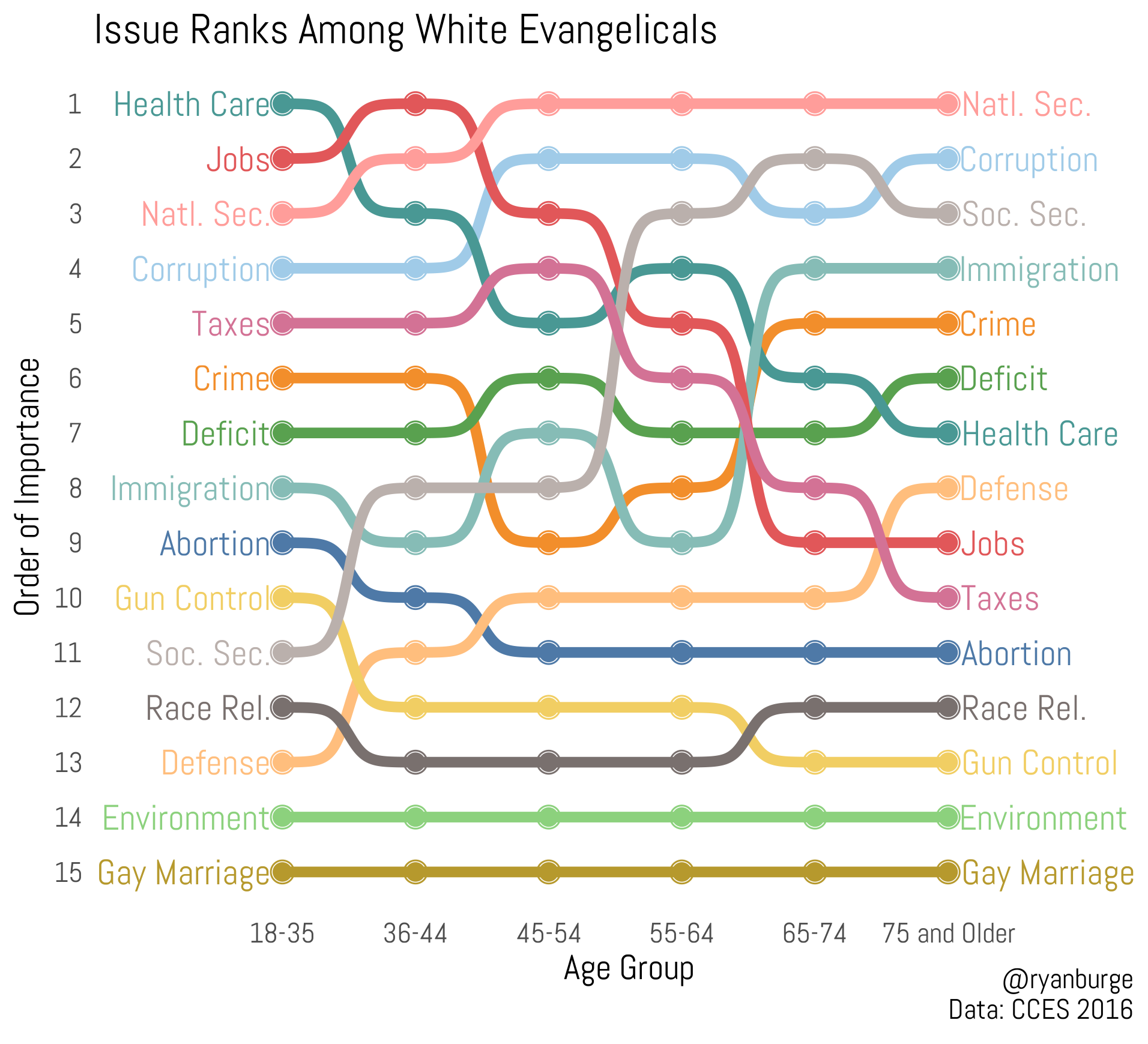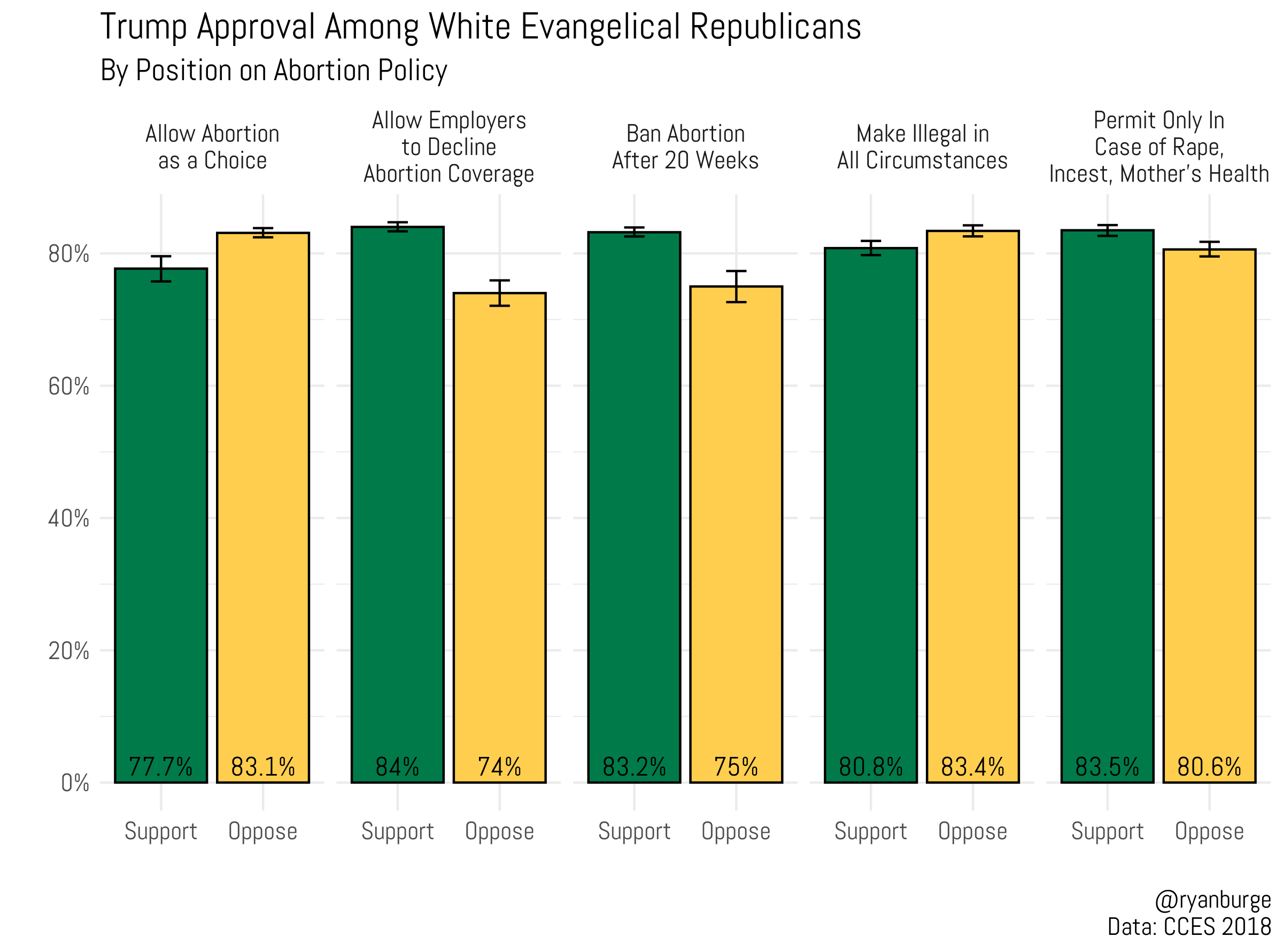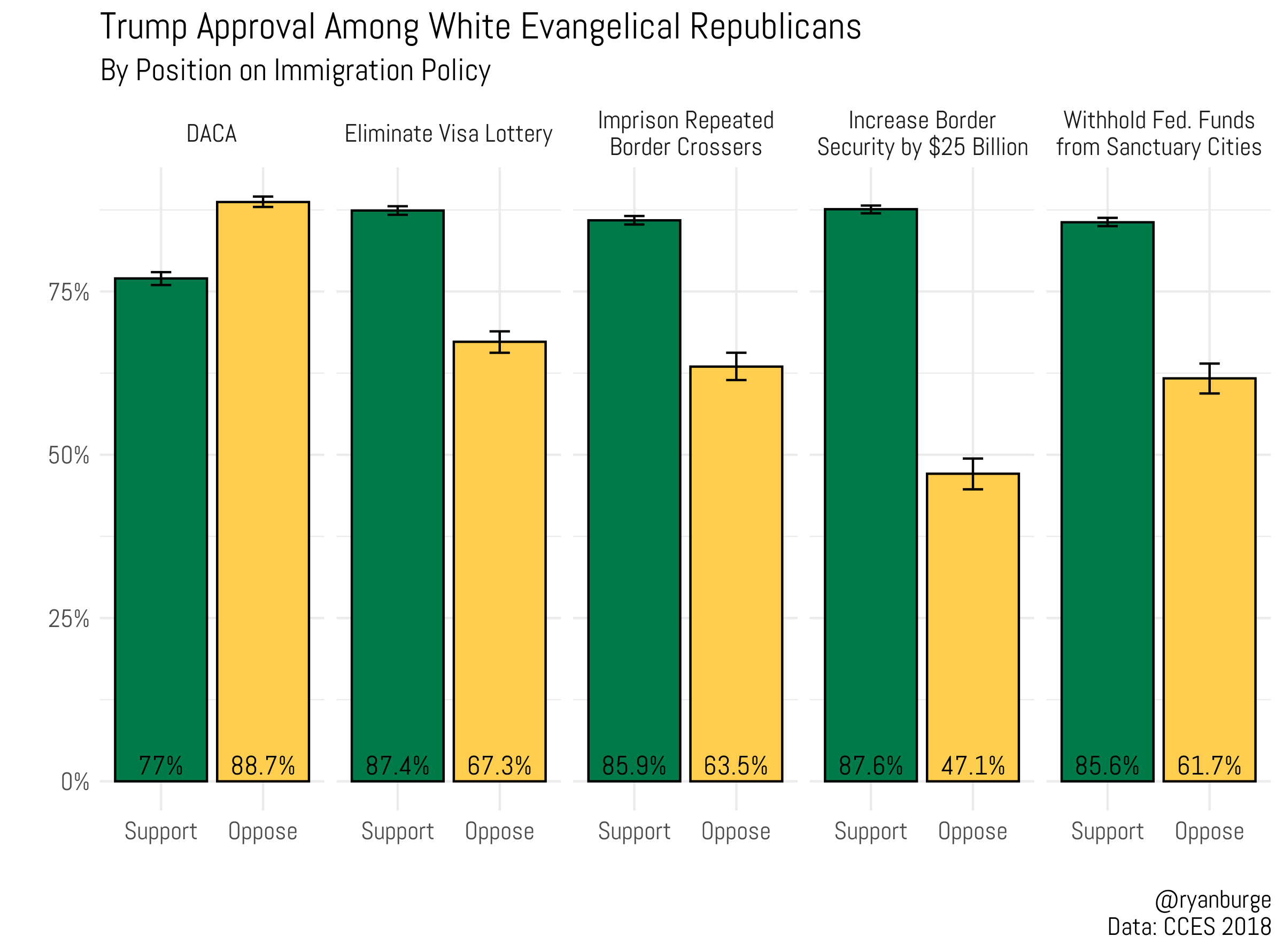By Ryan P. Burge, Eastern Illinois University
I have been mulling over what I’ve heard countless reporters espouse on social media and in their columns about religion and politics: white evangelicals vote for the Republican Party because it is seen as the party that is actively engaging in behavior to make abortion illegal in the United States.
I get the impulse and there’s historically a lot of evidence to back that up. Early in the 1970’s (before Roe v. Wade) to be religiously devout didn’t necessarily tie you to one party or another. For instance, 50% of white weekly church goers were Democrats in 1978, 40% were Republicans.
Then, the conventional wisdom is that the Religious Right came along and began to preach a politics focused on family values (the historical record and recent evidence runs counter to this narrative). One of those values was that life began at conception, so abortion was tantamount to murder. Thus, the modern white evangelical voter oftentimes is turned off by some of the planks in the Republican platform, but they hold their nose and pull the lever for the GOP because they don’t want any more babies murdered in the United States.
But, what if that’s not really true anymore? I began questioning that assumption when I wrote a post entitled, “Retired Evangelicals Care A Lot about Immigration, Less about Gay Marriage.” It was based on data from the 2016 Cooperative Congressional Election Study that asked participants how important 15 issues were to them.

The results were not what I expected. White evangelicals care more about the stuff that Republicans are typically concerned with: jobs, national security, taxes. There were two pure social issues on the list: gay marriage and abortion. Gay marriage ranked dead last among all age groups and by a fairly wide margin. Clearly, white evangelicals aren’t making a fuss about the issue anymore. Also, look at abortion. It’s ranked 9th among the youngest white evangelicals, but then drops to 11th and stays there among older age groups.
But, immigration is a different story. It was 8th most important among young white evangelicals, but then shoots up to fourth most important among retired evangelicals. I wanted to explore that: is Trump’s approval more predicated on abortion or immigration among white evangelical Republicans?
Okay, let’s just do a simple test. I restricted the sample to just white evangelical Republicans. And I divided them up based on their responses to five questions related to abortion. Then I calculated the share that had a positive approval rating of Trump in 2018 based on those five abortion questions. If abortion matters as much as we think it does, we should see that pro-choice Republicans evince lower levels of approval for Trump because his view of abortion is out of step with theirs on a key issue.

But, that’s not we see at all, really. In fact, the differences in approval of Donald Trump in 2018 were surprisingly small betweenpro-life vs. pro-choice white evangelical Republicans. For instance, 77.7% of those who support allowing abortion as a choice approve of Donald Trump, and only a slightly larger share of those who oppose abortion as a choice approve of Trump (83.1%). The gaps in approval between views of abortion are never over ten percentage points, oftentimes in the five point range). White evangelical Republicans who are pro-choice like the president a lot, almost as much as those who are pro-life.

However, when the policy focus shifts to immigration, there are some clear differences that emerge. Again, this is limited to just white evangelicals who identify as Republicans (a group that should be strong supporters of Donald Trump). Some real daylight emerges between the groups now. Among those who want to reduce immigration to the United States, Trump’s support is incredibly robust (85-90% approval).
However, his approval rating is much lower among those who don’t support Trump’s immigration policy – in some cases the gap is twenty points or more. It looks like white evangelical Republicans who don’t hold hard line views on immigration are much more likely to express disapproval than those who hold to divergent views on abortion.
But, does this all hold up in a statistical model? I interacted the question about abortion as a choice with the question about ending the visa lottery/family based migration. I also included controls for gender, church attendance, age, education, and income. Again, the sample is just white evangelical Republicans. Which one drags down support for Trump more: those who oppose his views of abortion or immigration? I have labeled the points, as these can become confusing oftentimes.
Those most supportive of Trump are in congruence with his views on both abortion and immigration. His approval rating stands at 90% among this group, which makes sense. Among those who align with his views of immigration but not abortion his approval is also robust (86%). Said another way, if a white evangelical Republican has a hard line immigration policy, their support for Trump doesn’t drop below 86%, regardless of their view of abortion.
The same is not the case for those who oppose his immigration policies. Among those who are opposed to a woman’s right to choose an abortion, but want to keep the visa lottery and family based migration, the predicted approval level is 78%. Among those who are in favor of the visa lottery and also abortion on demand, predicted support is even lower (71%). Or more directly: a white evangelical Republican who doesn’t agree with Trump’s immigration policy has an average approval rating of 78%, regardless of abortion views.

Taken together, I think I have made a fairly compelling case that white evangelical Republican support for Donald Trump is based more on immigration policy than his view of abortion. There’s always the possibility that Trump pulled white evangelicals further right on immigration than they wanted to be and that could be tested if the GOP’s next presidential nominee is a bit more moderate on immigration policy. But it’s fair to say that white evangelical Republicans follow the doctrine of Trump more than the (non-existent in 2020) platform of the GOP.
Ryan P. Burge teaches at Eastern Illinois University in Charleston, Illinois. He can be contacted via Twitter or his personal website. The syntax for this post can be found here.

What were the sample sizes like for the smallest subgroups in the data? Thanks for the post. This is really interesting!
LikeLike
Good Q. The pro-choice pro-immigration group was the smallest N = 260. Pro-Life/Pro-Immigration was 668. The other two were in thousands. The total survey was 60k. 11k evangelicals. So, good power.
LikeLike
It would be really interesting to see the same results for Catholics who voted for Trump, since the Church as an institution has been rather pro-immigration.
LikeLike
https://twitter.com/ryanburge/status/1299045081136201731 <- I replicated the analysis with white Catholics here.
LikeLike
Why do you think your research appeared to be ignored by the professionals at the RNC, who devoted multiple speeches to abortion but made very few references to immigration policy?
Are they stupid, lazy or bought-off?
LikeLike
Ryan,
This raises two observations/questions.
First, abortion was never a moral or political issue with evangelicals or with Protestants until it was seized upon by the moral majority, so perhaps the issue of abortion is not really in the Protestant DNA.
Why would immigration be an issue? Race! Protestants and especially southern Protestants have a long and sordid history here. White supremacy runs rampant. Race IS in our DNA!! And brown and black immigrants pose a serious challenge to white Christian America.
Dwight A Moody themeetinghouse.net
On Thu, Aug 27, 2020 at 11:06 AM Religion in Public wrote:
> Ryan Burge posted: “By Ryan P. Burge, Eastern Illinois University I have > been mulling over what I’ve heard countless reporters espouse on social > media and in their columns about religion and politics: white evangelicals > vote for the Republican Party because it is seen as the” >
LikeLike
[…] at Eastern Illinois University who focuses on politics and faith. That seems to have been true in 2016, as […]
LikeLike
[…] according to one study on the issues that are important to evangelical voters, immigration has emerged as an even more […]
LikeLike
[…] scientist at Jap Illinois College who focuses on politics and faith. That seems to have been true in 2016, as […]
LikeLike
[…] Eastern Illinois University who focuses on politics and religion. That appears to have been true in 2016, as […]
LikeLike
[…] according to one study on the issues that are important to evangelical voters, immigration has emerged as an even more […]
LikeLike
[…] according to one study on the issues that are important to evangelical voters, immigration has emerged as an […]
LikeLike
[…] who knows the data of American Christianity better than anyone IMO – shows convincingly in just a few graphs, that WAEs are more likely to support Mr. Trump if they are anti-immigration than if they are […]
LikeLike
[…] according to one study on the issues that are important to evangelical voters, immigration has emerged as an even more […]
LikeLike
[…] Notably, evangelical pastors addressed abortion more often. There are pro-choice evangelicals, though not many. So, this probably highlights the fact that we don’t know what the clergy said, just how often […]
LikeLike
[…] For White Evangelical Republicans, Approval of Trump is About Immigration more than Abortion – Ryan […]
LikeLike
[…] identify as pro-life, yet abortion appears to be less salient than many claim. Political scientist Ryan Burge observed that White evangelicals rank abortion surprisingly low on their list of priorities, behind such […]
LikeLike